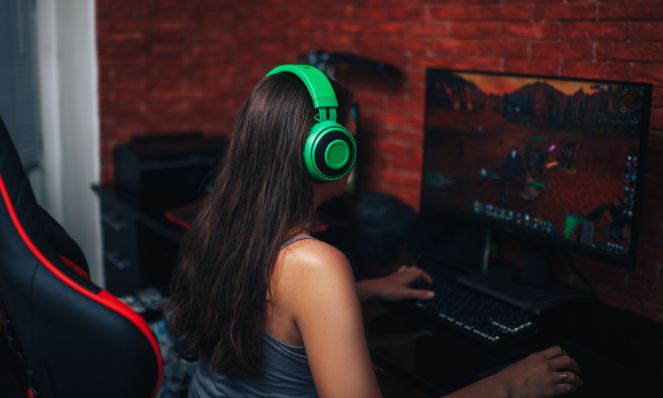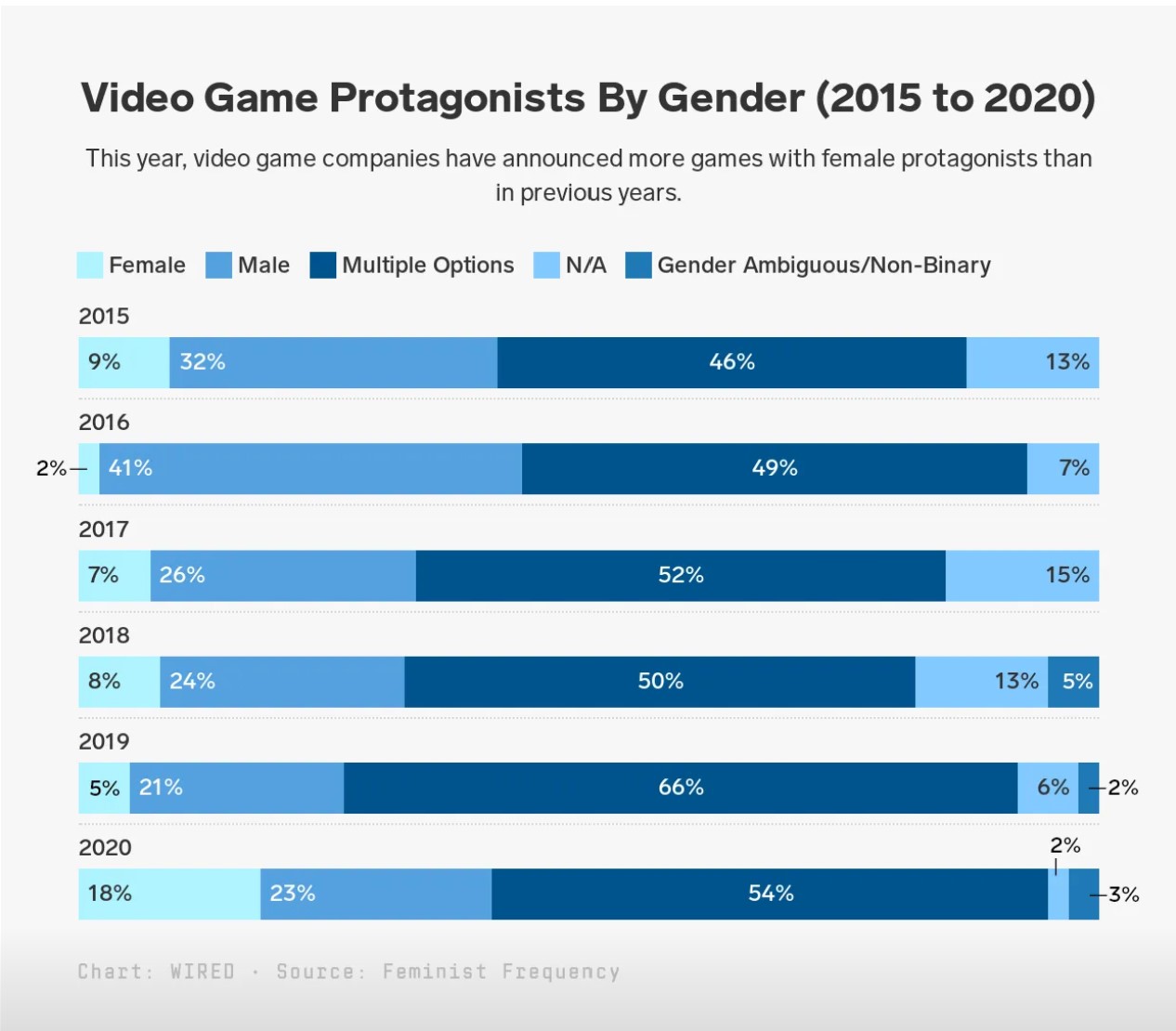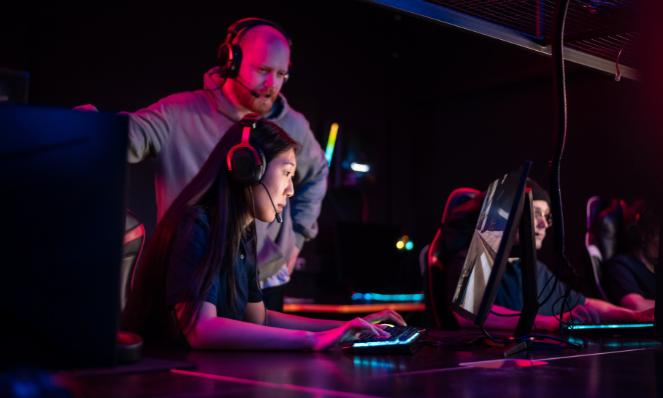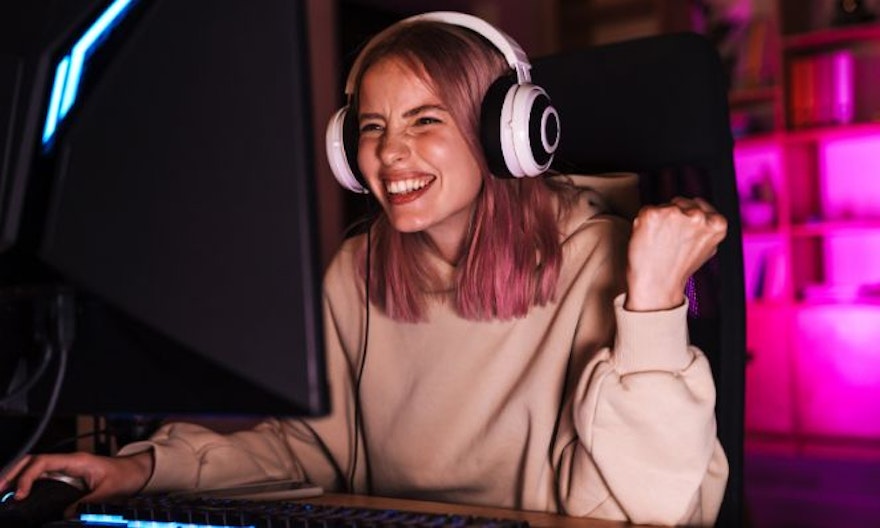What makes video games and esports so great? Anyone can play, regardless of their gender or ethnicity. The important word to grasp here is can. Even though anyone can play, it does not mean they do or feel safe doing so. According to Women in Games, approximately 50% of players globally are women. Women have always played video games, they are just not necessarily as vocal about it as men.
Gaming has mostly been male-dominated, and it has been mostly socially acceptable for boys to play video games without any comments or criticism. That is not the case with girls. Girls, especially women, are often envisioned as sexualized imposters who play video games for attention. Video games are associated with being a part of being a boy. That boys do boy things is a stereotype that video games have become a part of. Online multiplayer games like League of Legends are primarily male-dominated, while casual and cozy games like The Sims are mostly female-dominated. Although, girls also tend to gravitate towards fantasy games like Dragon Age: Inquisition rather than first-person shooter games like Call of Duty, recent studies show that female gamers play all types of game genres.
The issue of a lack of female representation, plagues gaming and the esports industry. Few women are making it in esports, and research shared exclusively with the BBC has found that there are no female players in the top 300 earners and only a tiny fraction of the millions being won in competitions around the world is going to women. To have a real and long-lasting effect and support girls in gaming, we need to affect the culture and provide them with a safe and welcoming environment that values their skills and treats them as equals.
We need to keep the conversation going about the importance of inclusivity and that anyone, regardless of gender or ethnicity, can be a gamer. According to research from Bryter, although men and women both experience abuse and online discrimination, female gamers are more likely to experience sexual harassment and be excluded from the game. It is common for, especially girls, to get negative comments from male players. A common excuse for making negative comments is that everyone gets negative comments online. The fact that negative comments are part of being online should not be a reason to make negative comments. If everyone is behaving negatively, it does not mean that you should do so as well. Anonymity online does not help with negative comments, as most people feel a sense of freedom by being anonymous online. They feel like they can say what they want, behave how they want, and degrade anyone they want. A previous ECA article covering toxicity in gaming goes into deeper detail about how dangerous anonymity can be and what behavior it can lead to.

What is a gamer?
Girls seem more reluctant to identify and refer to themselves as gamers. They might play video games once a week and therefore feel like they do not fit the description of the stereotypical definition of a gamer. Many feel that to identify as a gamer, one must play multiple games many times per week or daily. However, Merriam-Webster Dictionary defines a gamer as someone who regularly plays computer or video games. That definition is simplified, but as the writer Shannon Hunt discovered in 2020, as with most words, they often have different scopes of meaning for each individual. When she asked on Twitter and of her gamer friends, “What is a gamer?”, she got a lot of different responses that reflected each person's gaming style, and many listed negative stereotypes. Here are a few example definitions:
A gamer is someone who plays games as their primary choice of entertainment.
A gamer is someone who plays games more than they watch the television.
A gamer is someone who seeks out and finds all of the Easter eggs in the games that they play.
A gamer is someone who enjoys playing games so much that it takes over all of their spare time. They are antisocial in public but connected with their online community.
Someone who is knowledgeable about technology but puts little effort into their personal appearance and seems to have anger issues.
The significance of female role models.
Role models have a crucial role in promoting female representation in video games and encouraging more women to engage in gaming. When there is greater diversity among female gamer role models, it paves the way for diversity in the ethnicity and body types of video game characters, as well as among esports athletes, hosts, analysts, and streamers. A prime example of this progress can be seen in figures like Eefje “Sjokz” Depoortere and Jorien “Sheever” van der Heijden, who have emerged as female hosts and analysts in the esports industry. Sjokz is renowned for hosting the League of Legends World Championship and the LEC, while Sheever has made numerous appearances in Dota 2 tournaments.
In the past two decades, there has been a scarcity of women in hosting and analyst roles within the esports industry, making the rise of female role models a positive development. Furthermore, women are increasingly gaining decision-making positions, granting them a stronger voice in the development and design of video games. This is significant because addressing the issue of gender equality in the gaming industry as a cultural problem will require time to resolve.
Fortunately, the landscape of video games has witnessed rapid evolution. Developers are creating a broader range of games that no longer solely target teenage boys. Consequently, we now observe more well-rounded and well-constructed female characters like Ellie in The Last of Us Part II. This shift has brought about greater inclusivity and diversity in game characters and genres, significantly impacting the ability of girls to culturally identify as gamers. According to Feminist Frequency, 18% of games launched that launched in 2020 featured female characters, showcasing considerable progress in female character representation since data collection began in 2014.

Nevertheless, the gaming industry still has a long way to go in terms of gender equality and inclusivity, not only in the workforce but also within the gaming community. Despite nearly half of the gaming population is female, only 5% of that population is considered professional esports athletes. Esports has remained predominantly male-dominated for the past 50 years, with the scarcity of women in the professional scene stemming from factors such as lack of support from organizations and fans, harassment, unequal prize distribution between male and female tournaments, and gender stereotypes that downplay women's competitiveness. The pressing questions we must address involve how to support and nurture aspiring female esports athletes and how to break free from cultural gender stereotypes, such as the perception of women being confined to support roles.
Several approaches can be taken to address these issues. At the ECA, we are taking steps to educate the next generation of gamers, normalizing the idea that girls are gamers too, they play video games just like boys, and they enjoy taking on similar roles. As the video game and esports community becomes more accepting and tolerant of girls participating in gaming, we hope to witness a greater number of girls fearlessly playing the games they want and assuming the roles they desire, while showcasing their skills.
Support at the grassroots level is crucial.
The ECA partners with individuals and organizations dedicated to creating safe, inclusive, and educational environments that welcome all gamers. These environments be it esports academies or esports centers, serve as a safe space where girls can play the games they want, and their skills are acknowledged and nurtured under the guidance of knowledgeable ECA-certified esports coaches. Such environments are essential for fostering a sense of belonging in the gaming ecosystem, where girls should aspire to be associated with gaming and receive support from the community. They should feel encouraged to pursue careers as professional esports athletes without being hindered by their gender.

Much work must be done at all levels of the gaming ecosystem to build a safe environment that is inclusive, encouraging, diverse, and open to anyone. It is never too late to educate children and people in the gaming and esports industry about the importance of inclusivity and supporting girls in gaming.
